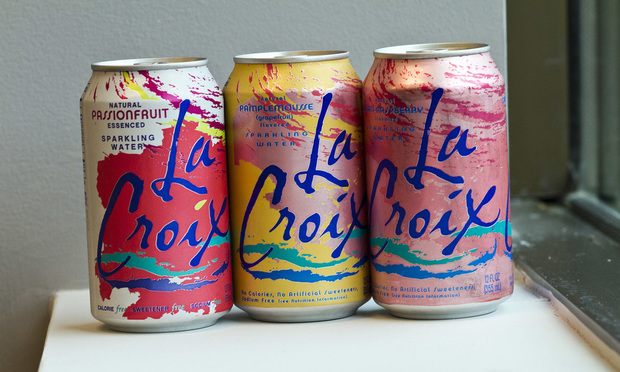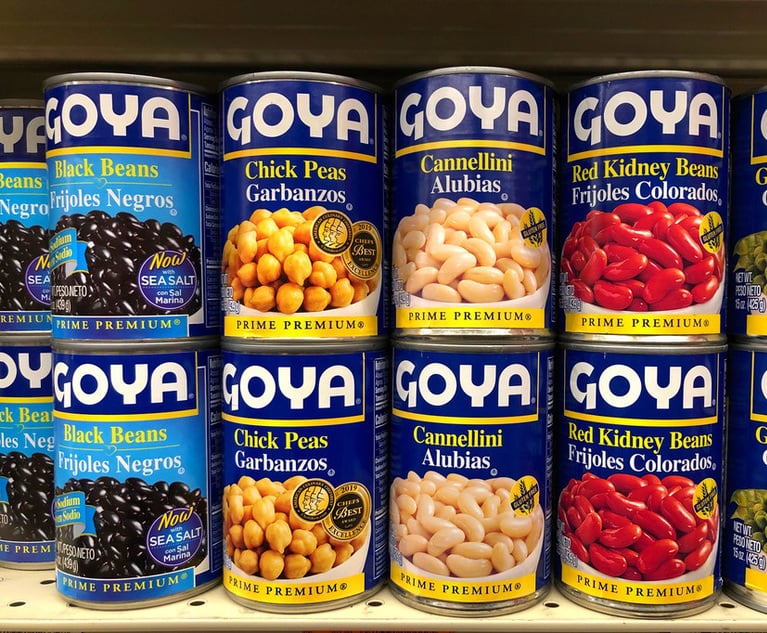In LaCroix's False Branding Lawsuit, Risk Management Lessons for Corporate Law
From coordinating with other departments to keeping language simple, legal experts share tips for mitigating, if not preventing, the chances of facing a lawsuit stemming from product labeling.
October 12, 2018 at 01:26 PM
4 minute read
 LaCroix water. Photo: John Disney/ ALM
LaCroix water. Photo: John Disney/ ALM
It's become a cult favorite, but now LaCroix flavored sparkling water has become something else: the subject of a class action lawsuit.
Chicago firm Beaumont Costales recently announced that it has sued LaCroix's parent company, National Beverage Corp., in Cook County for allegedly falsely branding its product's ingredients as “natural” when the U.S. Food and Drug Administration has classified them as “synthetic.”
Despite the relative commonality of these types of suits in recent years, the story garnered significant news coverage, likely because of the popularity of the product. And it probably didn't hurt that Beaumont Costales said one of the synthetic ingredients in LaCroix products is also used in cockroach insecticide, a tidbit that made for catchy headlines.
In a report published a few days after the original news—and covered by several news outlets—Popular Science magazine deemed the water “safe,” but LaCroix still felt the reputational damage, asking its consumers in a tweet to “please stand with us as we defend our beloved LaCroix.” National Beverage also chastised what it called a “false” and “defamatory” lawsuit over which it would “seek actual and punitive damages.”
Part of the problem, consumer product labeling legal experts said, is that the law around the issue is murky, and the FDA is still working to develop a clear objective standard for what is “natural.”
Corporate Counsel spoke with some of these experts to understand how legal departments can mitigate, if not prevent, the chances of facing a lawsuit stemming from product labeling.
Coordinate With Other Departments
Whether your advertising legal work is handled in-house or outsourced, advertising copy of any sort must be discussed among the marketing, research and development, and in-house legal departments before it is run in any medium, said Larry Weinstein, a litigation partner and co-head of the false advertising and trademark group at Proskauer Rose.
“It is way too often the case that there is no [eyes], or no adequate second pair of eyes on advertising because issue-spotting really is the key,” he said. “The bottom line is that for anything you tell the consuming public, you need make sure that it's accurate.”
If the label includes the term “natural,” Weinstein added, conversations between lawyers, R&D and marketing representatives should be occurring, and all the parties should be asking, “'What are the ingredients? Is there an issue about whether any of them can be described as natural?'”
Consider All Potential Plaintiffs
Litigation over consumer product labeling can come in several forms—from a competitor suing under the federal Lanham Act or a consumer class-action suit brought under state law, Weinstein said. In addition, he said, companies may turn to the National Advertising Division, an industry self-regulatory body, for dispute resolution, and the Federal Trade Commission also could opt to get involved.
The required burden of proof, the expense and the entire process are very different depending on the forum, so in-house lawyers should carefully consider who might bring a challenge and what the risks and costs of defending it are, Weinstein said.
“They have to ask, 'What is the likelihood and where? What are the costs?'” he said. “Maybe the benefit of this particular advertising claim would be well outweighed by the cost of defending a lawsuit.”
Keep It Simple
Raqiyyah Pippins, counsel at Arnold & Porter Kaye Scholer, advises her clients that the simpler the product or ingredient label, the better. In fact, she has a general suggestion: Try to avoid ingredients that are more than three syllables.
“Ideally, the ingredient names should be in terms that are facially commonly understood,” she said.
With regard to use of the term “natural,” Pippins also recommends using the standard adopted by the U.S. Department of Agriculture as a benchmark, which is a relatively narrow definition, even for non-agricultural products.
This content has been archived. It is available through our partners, LexisNexis® and Bloomberg Law.
To view this content, please continue to their sites.
Not a Lexis Subscriber?
Subscribe Now
Not a Bloomberg Law Subscriber?
Subscribe Now
NOT FOR REPRINT
© 2025 ALM Global, LLC, All Rights Reserved. Request academic re-use from www.copyright.com. All other uses, submit a request to [email protected]. For more information visit Asset & Logo Licensing.
You Might Like
View All
White Castle GC Becomes Chain's First President From Outside Family


Ben & Jerry’s Accuses Corporate Parent of ‘Silencing’ Support for Palestinian Rights
3 minute readTrending Stories
- 15th Circuit Considers Challenge to Louisiana's Ten Commandments Law
- 2Crocs Accused of Padding Revenue With Channel-Stuffing HEYDUDE Shoes
- 3E-discovery Practitioners Are Racing to Adapt to Social Media’s Evolving Landscape
- 4The Law Firm Disrupted: For Office Policies, Big Law Has Its Ear to the Market, Not to Trump
- 5FTC Finalizes Child Online Privacy Rule Updates, But Ferguson Eyes Further Changes
Who Got The Work
J. Brugh Lower of Gibbons has entered an appearance for industrial equipment supplier Devco Corporation in a pending trademark infringement lawsuit. The suit, accusing the defendant of selling knock-off Graco products, was filed Dec. 18 in New Jersey District Court by Rivkin Radler on behalf of Graco Inc. and Graco Minnesota. The case, assigned to U.S. District Judge Zahid N. Quraishi, is 3:24-cv-11294, Graco Inc. et al v. Devco Corporation.
Who Got The Work
Rebecca Maller-Stein and Kent A. Yalowitz of Arnold & Porter Kaye Scholer have entered their appearances for Hanaco Venture Capital and its executives, Lior Prosor and David Frankel, in a pending securities lawsuit. The action, filed on Dec. 24 in New York Southern District Court by Zell, Aron & Co. on behalf of Goldeneye Advisors, accuses the defendants of negligently and fraudulently managing the plaintiff's $1 million investment. The case, assigned to U.S. District Judge Vernon S. Broderick, is 1:24-cv-09918, Goldeneye Advisors, LLC v. Hanaco Venture Capital, Ltd. et al.
Who Got The Work
Attorneys from A&O Shearman has stepped in as defense counsel for Toronto-Dominion Bank and other defendants in a pending securities class action. The suit, filed Dec. 11 in New York Southern District Court by Bleichmar Fonti & Auld, accuses the defendants of concealing the bank's 'pervasive' deficiencies in regards to its compliance with the Bank Secrecy Act and the quality of its anti-money laundering controls. The case, assigned to U.S. District Judge Arun Subramanian, is 1:24-cv-09445, Gonzalez v. The Toronto-Dominion Bank et al.
Who Got The Work
Crown Castle International, a Pennsylvania company providing shared communications infrastructure, has turned to Luke D. Wolf of Gordon Rees Scully Mansukhani to fend off a pending breach-of-contract lawsuit. The court action, filed Nov. 25 in Michigan Eastern District Court by Hooper Hathaway PC on behalf of The Town Residences LLC, accuses Crown Castle of failing to transfer approximately $30,000 in utility payments from T-Mobile in breach of a roof-top lease and assignment agreement. The case, assigned to U.S. District Judge Susan K. Declercq, is 2:24-cv-13131, The Town Residences LLC v. T-Mobile US, Inc. et al.
Who Got The Work
Wilfred P. Coronato and Daniel M. Schwartz of McCarter & English have stepped in as defense counsel to Electrolux Home Products Inc. in a pending product liability lawsuit. The court action, filed Nov. 26 in New York Eastern District Court by Poulos Lopiccolo PC and Nagel Rice LLP on behalf of David Stern, alleges that the defendant's refrigerators’ drawers and shelving repeatedly break and fall apart within months after purchase. The case, assigned to U.S. District Judge Joan M. Azrack, is 2:24-cv-08204, Stern v. Electrolux Home Products, Inc.
Featured Firms
Law Offices of Gary Martin Hays & Associates, P.C.
(470) 294-1674
Law Offices of Mark E. Salomone
(857) 444-6468
Smith & Hassler
(713) 739-1250







